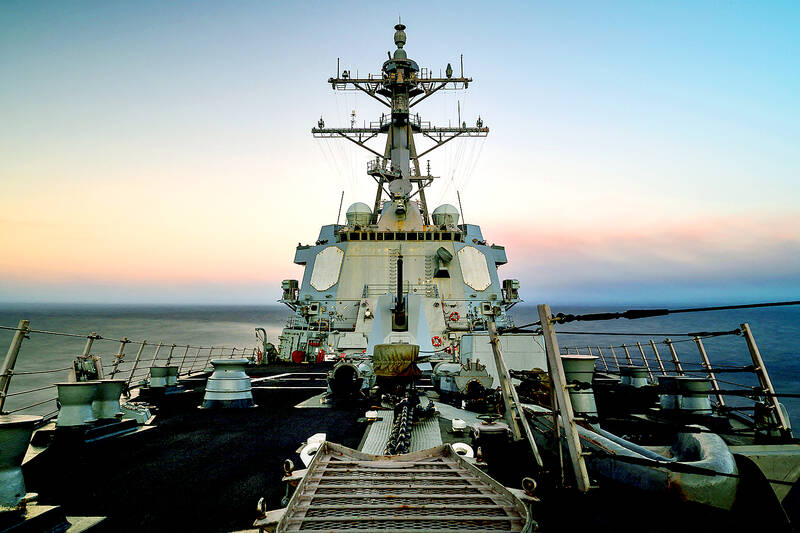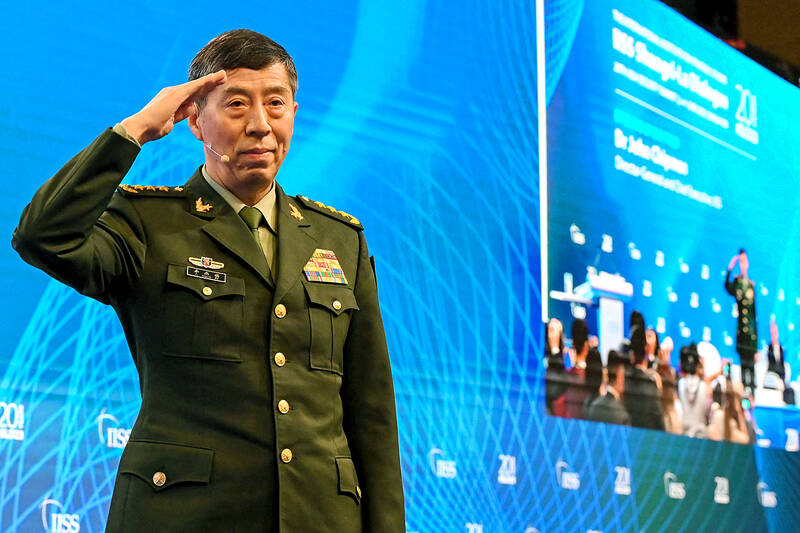The Ministry of National Defense yesterday urged the Chinese Communist Party to avoid provocative behavior after a Chinese navy ship crossed the paths of a US destroyer and Canadian frigate transiting the Taiwan Strait.
A Chinese ship on Saturday “executed maneuvers in an unsafe manner in the vicinity of [the USS] Chung-Hoon,” an American destroyer, the US Indo-Pacific Command said in a statement.
The vessel “overtook Chung-Hoon on their port side and crossed their bow at 150 yards [137m]. Chung-Hoon maintained course and slowed to 10 [knots, 18.5kph] to avoid a collision,” the statement said.

Photo: AFP / US Navy / Mass Communication Specialist 1st Class Devin M. Langer
It then “crossed Chung-Hoon’s bow a second time starboard to port at 2,000 yards and remained off Chung-Hoon’s port bow,” coming within 150 yards at the closest point, the US military said, adding that the “US military flies, sails and operates safely and responsibly anywhere international law allows.”
The Chung-Hoon was sailing through the Strait with the Canadian warship the HMCS Montreal in a joint mission.
In Taipei, the defense ministry said it was aware of the incident and dispatched naval and air force assets to monitor the situation.

Photo: AFP
“Maintaining the peace and stability across the Taiwan Strait and the region is the joint responsibility of democracies worldwide,” the ministry said in a statement.
“Any move that could escalate tension and danger will not contribute to regional safety. We call on the CCP to respect the freedom of navigation and avoid any excessively provocative behaviors,” it added.
In Singapore, Chinese Minister of National Defense Li Shangfu (李尚福) defended sailing the warship across the path of the US and Canadian vessels, telling a gathering of some of the world’s top defense officials that such so-called “freedom of navigation” patrols are a provocation to China.
In his first international public address since becoming defense minister in March, Li told the Shangri-La Dialogue that China does not have any problems with “innocent passage,” but that “we must prevent attempts that try to use those freedom of navigation [patrols], that innocent passage, to exercise hegemony of navigation.”
It is the second close encounter between US and Chinese military assets in less than 10 days, following what the US military said was an “unnecessarily aggressive maneuver” by one of Beijing’s fighters near one of Washington’s surveillance planes late last month.
Li said that the US and its allies had created the danger, and should instead focus on taking “good care of your own territorial airspace and waters.”
“The best way is for the countries, especially the naval vessels and fighter jets of countries, not to do closing actions around other countries’ territories,” he said through an interpreter. “What’s the point of going there? In China we always say: ‘Mind your own business.’”
Additional reporting by Shelley Shan

AIR SUPPORT: The Ministry of National Defense thanked the US for the delivery, adding that it was an indicator of the White House’s commitment to the Taiwan Relations Act Deputy Minister of National Defense Po Horng-huei (柏鴻輝) and Representative to the US Alexander Yui on Friday attended a delivery ceremony for the first of Taiwan’s long-awaited 66 F-16C/D Block 70 jets at a Lockheed Martin Corp factory in Greenville, South Carolina. “We are so proud to be the global home of the F-16 and to support Taiwan’s air defense capabilities,” US Representative William Timmons wrote on X, alongside a photograph of Taiwanese and US officials at the event. The F-16C/D Block 70 jets Taiwan ordered have the same capabilities as aircraft that had been upgraded to F-16Vs. The batch of Lockheed Martin

GRIDLOCK: The National Fire Agency’s Special Search and Rescue team is on standby to travel to the countries to help out with the rescue effort A powerful earthquake rocked Myanmar and neighboring Thailand yesterday, killing at least three people in Bangkok and burying dozens when a high-rise building under construction collapsed. Footage shared on social media from Myanmar’s second-largest city showed widespread destruction, raising fears that many were trapped under the rubble or killed. The magnitude 7.7 earthquake, with an epicenter near Mandalay in Myanmar, struck at midday and was followed by a strong magnitude 6.4 aftershock. The extent of death, injury and destruction — especially in Myanmar, which is embroiled in a civil war and where information is tightly controlled at the best of times —

Taiwan was ranked the fourth-safest country in the world with a score of 82.9, trailing only Andorra, the United Arab Emirates and Qatar in Numbeo’s Safety Index by Country report. Taiwan’s score improved by 0.1 points compared with last year’s mid-year report, which had Taiwan fourth with a score of 82.8. However, both scores were lower than in last year’s first review, when Taiwan scored 83.3, and are a long way from when Taiwan was named the second-safest country in the world in 2021, scoring 84.8. Taiwan ranked higher than Singapore in ninth with a score of 77.4 and Japan in 10th with

SECURITY RISK: If there is a conflict between China and Taiwan, ‘there would likely be significant consequences to global economic and security interests,’ it said China remains the top military and cyber threat to the US and continues to make progress on capabilities to seize Taiwan, a report by US intelligence agencies said on Tuesday. The report provides an overview of the “collective insights” of top US intelligence agencies about the security threats to the US posed by foreign nations and criminal organizations. In its Annual Threat Assessment, the agencies divided threats facing the US into two broad categories, “nonstate transnational criminals and terrorists” and “major state actors,” with China, Russia, Iran and North Korea named. Of those countries, “China presents the most comprehensive and robust military threat